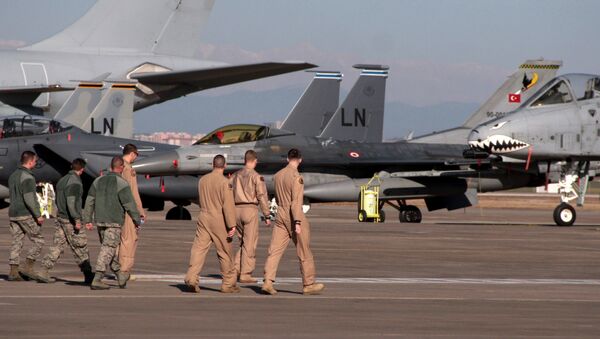According to the New York Times report, unnamed fficials in Washington claimed that at the moment US nuclear weapons believed to be stored at Incirlik Air Base in Turkey are “essentially [President] Erdogan’s hostages” but to move them would signal an end to the US-Turkish alliance.
Jana Jabbour, a Professor of Political Science at Sciences Po in Paris and an expert on Turkey and the Middle East, believes that the information in the NYT article may not be credible, because the Incirlik Airbase in Turkey, located about 100 miles from the Syrian border, is very important to Washington, especially given the US simmering tensions with Iran.
“Nuclear weapons that are deployed in the Incirlik airbase might be used at any time against Iran in the context of a surprise war between the United States and Iran - and these nuclear weapons can also serve to guarantee the security of neighbouring Israel. So, given the strategic importance of the Incirlik Air Base and given the strategic importance of these weapons in the context of a potential war in the Middle East, I highly doubt that the United States would withdraw or redeploy these nuclear weapons,” Professor Jabbour explained.
But if it does happen and the US chooses to evacuate these weapons, then Turkish President Recep Tayyip Erdogan's strong rhetoric aimed at Washington will increase, although it's doubtful he would cut ties with the US or leave NATO, Jabbour said.
“He [Erdogan] will continue on this path of criticising the West and the United States in particular - for betraying Turkey and for abandoning Turkey in critical times and for jeopardising Turkey's security. However, at no point would Erdogan consider a withdrawal of Turkey from NATO,” the political expert points out.
Mrs. Jabbour also describes the prospect of these weapons being used as “extremely dangerous” because of the current situation in Syria.
“There is a huge instability. Different powers and different movements are trying to fill the vacuum left by the United States after the withdrawal of the American troops. So, these claims are extremely dangerous in a context in which we are living: a period of instability. And if nuclear weapons or other dangerous weapons are used in such a context, this would lead to a major military confrontation or to an all-out war in the region,” the Middle East expert warns.
Turkey launched ‘Operation Peace Spring’ last Wednesday after Trump announced that he is withdrawing US forces from the Turkish-Syrian border and said he wants to pull out all 1,000 American troops from Syria.
POTUS has been criticised for his move by both Republicans and Democrats, with some saying that the US has abandoned its Kurdish allies, who had helped fight against Daesh* terrorists in Syria and allowed Turkey to begin its offensive.
On, Monday, US Vice President Mike Pence told reporters outside the White House that Donald Trump had spoken directly to President Erdogan and asked for an immediate ceasefire and to begin talks with the Kurdish forces. Pence also said that Trump signed an executive order implementing new punitive measures against Turkey.
Today, President Trump signed an executive order implementing a new range of sanctions against Turkey. To be very clear, President Trump called on the President of Turkey to stop the invasion, to enact an immediate cease fire & to begin negotiations with Kurdish forces in Syria. pic.twitter.com/xh9hCvM51N
— Vice President Mike Pence (@VP) October 14, 2019
The sanctions include double tariffs on steel imported from Turkey and targeted sanctions on the Turkish ministers.
Trump announced on Tuesday that the Vice President, together with US Secretary of State Mike Pompeo, is set to meet with the Turkish leader in Ankara on Thursday to try and negotiate a ceasefire.
Erdogan has insisted that Turkey will hold not negotiations with the Kurdish militia, considered as terrorists affiliated with the outlawed Kurdistan Workers' Party (PKK) by Ankara.
Turkey says it’s offensive is not targeting the Kurds but only the "YPG/PKK terrorists" and insists the goal of the operation in northern Syria is to neutralise terror threats against Turkey.
*Daesh (ISIS, ISIL, IS, Islamic State) is a terrorist organization banned in Russia and many other countries.



